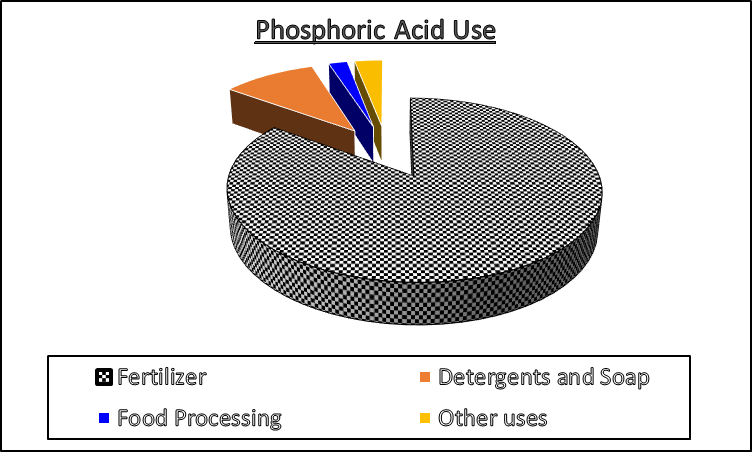Blog
Phosphoric Acid Uses: Comprehensive Guide to Its Applications
Phosphoric acid uses are vast, ranging from agriculture to industrial applications. This essential compound, found in both nature and manufacturing processes, plays a crucial role in numerous sectors. Understanding the uses of phosphoric acid helps us appreciate its importance in everyday life. In this article, we will explore the primary applications of phosphoric acid, shedding light on its role in food, agriculture, and various industrial processes. If you’re looking for expert advice on phosphoric acid solutions, Book a free consultation session with Our Expert today!
What Is Phosphoric Acid?
Phosphoric acid (H₃PO₄) is a colorless, odorless liquid that is widely used in both industrial and agricultural sectors. It is produced through the treatment of phosphate rock with sulfuric acid. Known for its ability to act as a pH regulator and a chemical reagent, phosphoric acid has a variety of applications in different industries.
Phosphoric Acid Uses in Agriculture
Phosphoric acid uses in agriculture are primarily linked to fertilizers. Farmers use it to promote healthy crop growth by enhancing soil fertility.
Fertilizer Production
One of the primary phosphoric acid uses in agriculture is as a component in fertilizers. Phosphoric acid is a key ingredient in the production of phosphate fertilizers, which supply essential nutrients to crops. It helps improve the root development of plants, leading to better yields.
Soil pH Regulation
In addition to fertilizers, phosphoric acid helps regulate soil pH levels. This adjustment ensures crops absorb nutrients effectively.

Phosphoric Acid Uses in Food and Beverages
Phosphoric acid uses in the food and beverage industry are also significant. It is a common additive in many processed foods and drinks, playing a role in enhancing flavors and preserving products.
Acidifying Agent
One of the most common phosphoric acid uses in beverages is as an acidifying agent. It helps give sodas their tangy flavor and regulates the acidity in other drinks. This makes the product more palatable and helps preserve it longer.
Food Additive
In the food industry, phosphoric acid is used as a preservative and emulsifier. It helps keep processed foods stable and ensures that they retain their quality over time. Foods like cheese, jams, and even some canned goods may contain phosphoric acid to prevent spoilage.
Phosphoric Acid Uses in Industrial Applications
Phosphoric acid uses in industry are diverse, with applications ranging from rust removal to water treatment. Its versatility makes it a valuable tool in various manufacturing processes.
Rust Removal
One of the key phosphoric acid uses in industry is rust removal. It is a component in rust converters that turn iron oxide (rust) into a black phosphate layer. This layer protects the metal from further corrosion, making phosphoric acid an essential product for metal preservation.
Water Treatment
In water treatment plants, phosphoric acid is used to prevent the formation of harmful by-products. It helps in controlling the levels of lead and copper in the water, ensuring it remains safe for consumption. The ability to control corrosion in pipes makes it a critical component in municipal water treatment systems.
Phosphoric Acid Uses in Pharmaceuticals
The pharmaceutical industry also benefits from the many phosphoric acid uses. It plays a role in the formulation of certain medications and supplements.
Dental Care Products
Phosphoric acid is a common ingredient in dental care products, especially in the etching process of tooth enamel before applying dental sealants. This use of phosphoric acid allows dentists to create better adhesion for fillings and other dental materials.
Medicine Formulation
In pharmaceuticals, phosphoric acid helps regulate the pH levels of certain medicines, ensuring stability and effectiveness.
Phosphoric Acid Uses in Cleaning Agents
Another important sector where phosphoric acid is utilized is the cleaning industry. Phosphoric acid uses in cleaning agents are widespread, thanks to its ability to break down stubborn stains and residues.
Household Cleaners
In household cleaning products, phosphoric acid helps remove hard water stains, grease, and other build-ups. It is particularly effective in cleaning surfaces in kitchens and bathrooms, where limescale and mineral deposits are common.
Industrial Cleaners
For more heavy-duty cleaning, phosphoric acid is used in industrial-grade cleaners. It effectively breaks down rust, mineral deposits, and tough residues in machinery and surfaces. Its ability to dissolve scale makes it indispensable in industrial maintenance.
Environmental Concerns and Safety Measures for Phosphoric Acid
While phosphoric uses offer many benefits, there are environmental concerns and safety measures associated with its use. Proper handling and disposal are crucial to minimize the environmental impact and protect workers in industries that use phosphoric acid.
Environmental Impact
Phosphoric acid can contribute to water pollution if not disposed of correctly. Overuse in agriculture may lead to runoff into water bodies, potentially harming aquatic ecosystems. Hence, regulatory measures must be in place to prevent over-application.
Safety Precautions
When using phosphoric acid, workers must follow proper safety protocols. This includes wearing protective gear, as exposure to phosphoric acid can cause skin irritation and, in some cases, chemical burns. Proper ventilation is also essential when working with phosphoric acid in confined spaces.
Conclusion
Phosphoric uses extend across numerous industries, from agriculture to food production and industrial applications. This versatile compound plays a vital role in our daily lives, offering benefits that range from boosting crop yields to preserving our favorite foods. Understanding its various uses allows us to better appreciate its importance.
